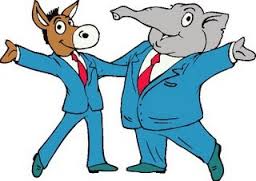
记忆方法
将“bi-”视为“两个”或“双”,而“partisan”意味着“政党成员”或“有党派性的”。想象两个来自不同政党的成员(partisan)联合或合作(bi-),因此“bipartisan”表示跨党派的合作或共识。
以上内容由AI生成, 仅供参考和借鉴
中文词源
bipartisan 两党的
前缀bi-, 二。party, 政党。
英语词源
- bipartisan (adj.)
- also bi-partisan, 1894, from bi- + partisan.
权威例句
- 1. There was a bipartisan agreement on the need for discussions.
- 需要讨论这一点得到两党的同意.
- 2. In most states the power of the bipartisan machines had been shattered or at least curtailed.
- 在大多数州,由两党组成的政党核心小集团的权力已经动摇,至少有所减弱.
- 3. There is growing bipartisan support in Congress for changing those rules.
- 而国会两党议员对要求放松限制的支持率正在上升.
- 4. He has repeatedly stated his bipartisan intentions, flexibility, and openness to compromise.
- 他不止一次表示要走两党路线,会采取柔韧性的政策并且会采取折衷方式.
- 5. Which living person do you most despise? Hey, I'm bipartisan.
- 还活着的人里你最鄙视谁? 喂喂喂, 我可是两党通吃的.